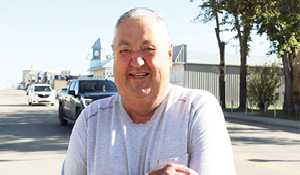Province’s longest pornography sentence makes sense
November 20, 2017, 2:23 pm

Every criminal sentence is fact-specific, individualized and guided by precedents from Appellate Courts. But a Saskatoon Provincial Court Judge may finally have broken through years of inadequate sentences for the ultimate form of child abuse.
Judge Vanessa Monar-Enweani sentenced Phillip Chicoine to 12 years in a depraved child pornography case where Chicoine admitted paying over $20,000 to watch desperately poor mothers in Romania and the Philippines abuse children—often their own—involving 18 victims over six years.
Chicoine live-streamed the sexual torture and abuse, then took screen shots and created over 4,500 photos and videos of the victims, some only 10 months old, that he shared with pedophiles around the world.
In all, Chicoine had over 14,000 images, prompting internet sex crimes investigator Jared Clarke to call this the worst case he had ever seen. And the RCMP Corporal told my radio show how he turned to professional counselling to deal with the effects of having viewed the atrocities on Chicoine’s computer.
This sentence finally ends a lot of the misplaced self-congratulations that resulted from some Saskatchewan Courts moving to five-year sentences for extremely abusive and violent child pornography.
A case in point was Shane Pattison, sentenced in 2012 to five years for possessing nearly 4,500 images of what a judge described as depraved and “life altering” images, some of them featuring the rape of babies.
To no one’s surprise—like many other notorious serial pornography deviants—it took Pattison just days, after his early release three years later, to be found with thousands of new images that included the sexual torture of toddlers.
At the time of Pattison’s woefully inadequate sentence, I pointed out that similar cases in the United States netted sentences in the range of 7 to 10 years, with collections as extensive and vile as his warranting 15 years or more.
Now, the Chicoine decision presents an opportunity for a rational discussion on sexual deviants who prey on defenseless children by watching, creating images and then sharing unspeakable acts of abuse, degradation and human violation.
The notion of punishing these men brutally and permanently is understandable for anyone with the instinct to defend a vulnerable child. But in Canada’s legal system the concept of punishment was removed years ago.
Today, the principles of sentencing include deterring the offender and others from crime, denouncing the behavior, protecting the public, and rehabilitating the offender.
Lengthy sentences are a start but they must also be understood within the modern math of corrections.
When a sentence is handed down, the Judge then must deduct from the sentence the time already spent in custody awaiting trial (usually multiplied by 1.5).
Of the remaining time to be served, every offender, except a murderer, is eligible at one-third of that time to be granted full parole in the community.
Day parole can be granted six months before that and a range of even earlier escorted and unescorted absences may also be authorized.
And, in any event, the law provides that every criminal, except for the most dangerous, must be freed at two-thirds of his sentence.
In serious cases, like Chicoine’s, the Judge can move parole eligibility to one-half from one-third, which the Judge in this case declined to do as it would be “punishment”.
While a parole hearing is a right, being released early is not. That happens only if an offender’s risk is manageable in the community.
Given the high failure rate of serial sexual deviants, at least a lengthy sentence can keep an offender behind bars a bit longer in order to protect children in the community.
Sadly, bearing in mind past practice, Chicoine will likely be released early and he will also likely fail.
But at least a 12-year sentence is a good starting point for the clear message from the public that our tolerance is drawing short for predators in our midst and our denunciation couldn’t be clearer.




































